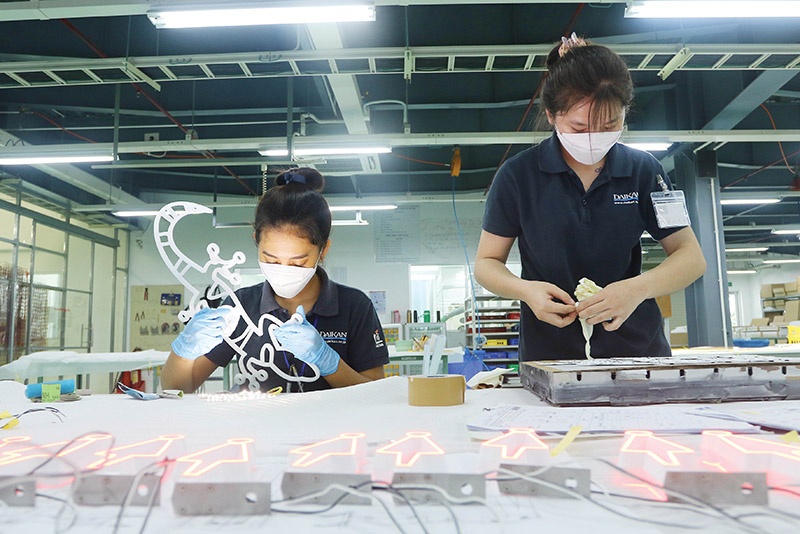New foreign capital stutters despite overall deal boost
At a meeting with the leader of the southern province of Binh Duong last week, chairman of Sharp Corporation Yoshihiro Hashimoto revealed an expansion plan in the locality.
 |
| Investors already with factories in the country are demonstrating that they trust the business climate here, Photo: Le Toan |
Sharp Group is exploring opportunities in the southern provinces of Vietnam, including Binh Duong, to move the supply chain away from the Chinese market, promoting market diversification and distribution, according to Hashimoto. “In the coming time, Sharp will continue to expand and build one more large-scale factory, oriented to develop high-tech and advanced products,” he said.
Binh Duong is assessed as a locality with an attractive investment environment, in line with Sharp’s criteria. The group has two production factories located in Vietnam, at Singapore Industrial Park (VSIP) I and an extended VSIP II. Sharp hopes to be supported in construction land, labour, and connected transport infrastructure, as well as enjoying tax incentives and construction costs.
Sharp’s factory will manufacture and process electrical products, electronics, high-tech components, smartphones, and feature production of household electronics, household electrical appliances, and healthcare items.
Processing and manufacturing has always been the hottest industry for foreign direct investment (FDI) in this country over the past 30 years. In addition to luring a huge amount of funding, this is also the favourite of big industrial corporations like Samsung, LG, Canon, Honda, and Toyota, which continue expanding facilities in Vietnam.
South Korean giant Samsung is the biggest example, having set foot in Vietnam 14 years ago. It started with a smartphone manufacturing complex in the northern province of Bac Ninh before scaling up its interest in Hanoi, Thai Nguyen, and Ho Chi Minh City, eventually reaching almost $20 billion in total investment in Vietnam.
Singapore’s Fujifilm Business Innovation expanded its factory by $492 million in Ho Chi Minh City in the first months of the year, in addition to the millions-of-dollars capital expansion of factories in Bac Ninh, Nghe An, and Haiphong for manufacturing electronics, network equipment, and multimedia audio products.
A report in June from HSBC said that Vietnam’s economy continues to brighten and is becoming an emerging manufacturing hub for the globe, making up a significant market share in numerous sectors like electronics, textiles, and footwear.
According to the Ministry of Planning and Investment (MPI), in the January-July 20 period, the processing and manufacturing industry saw $10 billion of FDI capital in Vietnam. Accumulated as of July 20, $254.36 billion has been registered in this industry, four-fold of the second-biggest industry of real estate. Additionally-registered FDI in the January-July 20 period was $7.24 billion, a rise of 59.3 per cent on-year, and share-purchases funding was $2.58 billion, up 25.7 per cent on-year.
In the context that global FDI has yet to recover totally, the signs are positive for foreign inflows in Vietnam. “Foreign investors are continuing to expand into Vietnam, meaning that they trust in the economy and investment climate of Vietnam,” said Do Nhat Hoang, director general of MPI’s Foreign Investment Agency (FIA).
However, newly-registered investment into Vietnam is still declining. During the January-July 20 period, $5.72 billion was poured into 927 newly-licensed projects, a slight decrease of 7.9 per cent in the number of projects and a sharp reduction of 43.5 per cent in value.
Hoang explained that the newly-registered funding is still suffering the impacts of the pandemic, so some investment promotion conferences have not been held, and some investors have not yet been able to visit Vietnam.
“However, the on-year decrease has been improving on a month-by-month basis,” Hoang said. “We should prepare more carefully to take advantages of relocating global supply chains.”
What the stars mean:
★ Poor ★ ★ Promising ★★★ Good ★★★★ Very good ★★★★★ Exceptional
Related Contents
Latest News
More News
- Kim Long Motor and BYD Battery start electric vehicle battery plant in Hue (January 28, 2026 | 09:56)
- SHIFT project launched to steer capital towards green growth (January 28, 2026 | 09:52)
- Haiphong steps up supporting industry ecosystem efforts (January 27, 2026 | 16:09)
- Century Synthetic Fibre inaugurates Unitex factory in Tay Ninh (January 26, 2026 | 16:03)
- SLP supporting Vietnam in closing FDI-related gaps (January 26, 2026 | 10:06)
- UK–Vietnam partnership advances BIM centre for railway development (January 24, 2026 | 11:20)
- Nghe An issues criteria for Quynh Lap LNG plant selection (January 22, 2026 | 20:20)
- Vietnam as a manufacturing hub: why on-the-ground inspection matters (January 22, 2026 | 11:47)
- 14th National Party Congress: Building Hue into distinctive international cultural, tourism hub (January 22, 2026 | 09:27)
- British rail businesses strengthen cooperation in Vietnam (January 21, 2026 | 18:10)

 Tag:
Tag:





















 Mobile Version
Mobile Version